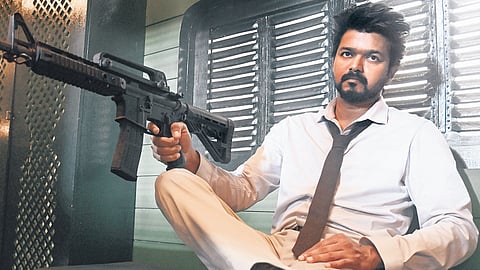

As we sit down for an interview at her office, creative producer Archana Kalpathi says, “The exam has been written. We are just waiting for the results.” Partly heaving a sigh of relief for the extensive work that has gone through and partly anxious for the reception, she opens up by saying, “We have shot the film for almost 150 days. Vijay sir himself has been on set for 120 days. This is one of the longest call sheets that he has ever given since it is a double role and a very challenging screenplay.” From charting a budget, and ensuring funds to match Venkat Prabhu’s vision, Archana has done everything in her power to make sure the film reaches its finish line.
In this extensive conversation, Archana gives a sneak peek into her job as a creative producer, curating promotional strategies, factors that go into releasing a film on time, the mutual trust her team shares, and more...
Excerpts:
Apart from the fact that Vijay is a bankable star and you are his fan, what was the one aspect that made you take on the project?
The Greatest of All Time (GOAT) has a very interesting and racy screenplay. That was catchy for me. Like Ghilli and Thuppakki, you won’t have a moment to pause. It is easy to make a film with a good story and screenplay, but it is extremely difficult to make a solid film with a big star since expectations are always sky-high. It is like writing an exam when you are the topper, you are expected to score big. In a smaller film, you can experiment and take risks, but for a film like GOAT, the script needs to be spot on. Even a small error will be magnified.
As a creative producer, in what capacity are you involved in the filmmaking process? Did you suggest any major changes?
We don’t suggest changes in the script. The production house has three major roles. We decide the budget and lock the number we are going to spend on the film. Then we arrange for the funding, which is taken care of by my father. My job is the execution. I have a senior executive producer and 12 line producers. The production team has 45-50 people. We are in charge of getting artists’ dates, figuring out logistics, getting permissions, and fulfilling the director’s requirements. When he pitches ideas, I tell him if they are viable or not, depending on the budget. For example, Venkat suggested shooting in Istanbul, but we realised it would be very expensive, so we suggested Russia. There would usually be a 5-7 per cent budget variation. It shouldn’t go beyond that.
For a big star film, the stars themselves are a vehicle for promotions. In such cases, how do you work around your promotional strategies?
We have print advertisements and branding in metro stations. We have also started putting up hoardings. In Tamil Nadu, it is illegal to place hoardings in several areas. Every state has its own restrictions. Online, apart from interviews we also engage with meme pages, and collaborate with influencers and individuals on X (formerly Twitter). But the most effective promotion is a film’s trailer. However, no matter how much you promote, you can’t save a bad film. At the same time, no matter how much you try, you can’t stop a good film from running.
How do you maintain secrecy around a project when a big star is involved? What are the rules that you have on set?
We keep reminding the stars not to share details. We tell everyone not to share their location while on set; no cameras are allowed and they should be deposited inside a box. We have colour-coded passes for people on set. We also have mutual trust among ourselves which is why you don’t have even a single BTS still from GOAT. We are happy we shot the film without a single leak.
Do you often gauge the pulse of the audience on social media and provide inputs to the director?
We can’t interfere with the director’s creative space. However, as a production house, it is my responsibility to read all the comments, see how they are trending, and note down what people are thinking. I also anonymously listen to X Spaces and see what they are talking about. I am a very outspoken person, so I tell them my honest opinion. Even with Atlee, when we were working on Bigil, we always had open conversations, because feedback is very important for the direction team as well.
This is Vijay’s penultimate film before his entry into politics, so how did this influence the narrative and the way the film has been crafted, especially considering the expectations from his fans and other political implications?
We were not aware of Vijay sir’s political entry at the time. We congratulated him and resumed work right away. There is no connection between his political entry and the film, only the public is joining the dots. Vijay sir just wanted an extremely entertaining film.
What have your three biggest learnings been ever since you started working as a creative producer in 2019?
When the basic hardbound of the film is not good, we cannot save any of it. You cannot fix it halfway. There needs to be a strong premise. Casting choices are very important as they can make or break a film. Time management is also a crucial factor. It is healthy when we start a film without an end date. That is when we will have discipline. There will be immense pressure but as you know, diamonds are formed under pressure.